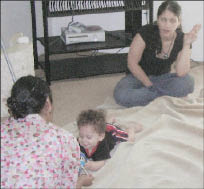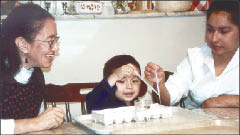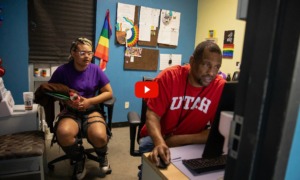Based on growing evidence that both intellectual and emotional development begin at, if not before, birth, voluntary home visitation programs for pregnant women and families with children under age 5 have spread gradually over the past couple of decades. Now they appear poised to multiply more quickly if health care reform containing dedicated federal funding passes Congress this fall.
Under these home visitations, professionals or paraprofessionals visit households to work on such issues as improved parenting skills, reducing risk for child abuse, promoting prenatal and early childhood health, and preparing children to succeed in school.
President Obama has proposed funding such programs in his 2010 budget, and Congress has included funding provisions in the health reform bills. Any new federal policy has the potential to bring new dollars and new structure to the field. “What is essential is that federal resources are used to improve the quality of existing programs,” says Kay Johnson, a consultant and author of two national reports on state home visiting programs.
Many teen parents are among those considered in need of such services, which can include parenting education, life skills development, and referral to child care, health, and other services.
Such programs number well over 4,000 in 40 states. Deborah Daro, research fellow at Chapin Hall at the University of Chicago, testified before Congress in June that an estimated 400,000 to 500,000 young children and their families nationwide receive such services each year.
Citing several studies, Daro told the House Ways and Means Subcommittee on Income Security and Family Support that “although positive outcomes continue to be far from universal, families enrolled in these home visitation programs, as compared to participants in a formal control group or relevant comparison population, report fewer acts of abuse or neglect toward their children over time, engage in parenting practices that support a child’s positive development, and make life choices that create more stable and nurturing environments for their children.”
However, the mixed results of evaluations provide reason for caution. A recent report in the Future of Children journal concludes that “researchers have found little evidence that home-visiting programs directly prevent child abuse and neglect. But home visits can impart positive benefits for families,” including better parenting practices that lead to “improved child well-being.”(See Report Roundup.)
About half of the 40 states that have passed legislation to fund a system of home visitation spend an aggregate of about $250 million nationwide, Johnson says. Funding sources have included Medicaid, Temporary Assistance for Needy Families (TANF), the Title V Maternal and Child Health Block Grant, state funds and local education funds, she says.
Chapin Hall at the University of Chicago hosted a webinar last month, “Evidence-Based Systems of Home Visitation: Opportunities for Replication and State Innovation,” featuring some of the people and programs in this story. To listen to the webinar and view the materials, go to http://www.chapinhall.org/events/governing, and click on the webinar title.
The competing House and Senate versions of health care legislation contain funding for home visitation in the range of $100 million to $150 million for 2010, increasing to $500 million to $700 million by 2013. Congress would be required to provide states funding to offer voluntary programs for first-time mothers, Johnson says. That would represent a sea change for the field, says Daro, who remembers the early 1990s when Hawaii had the only statewide program.
A significant issue, Johnson says, will be whether the legislation explicitly endorses the most rigorously tested program model, the Nurse-Family Partnership, or takes the approach of most states in creating a network that’s based on several program models, such as the more widespread Parents as Teachers.
While promoted by the Obama administration, the idea of home visitation has significant Republican support, most notably from Sen. Kit Bond (R-Mo.), whose support when he was governor of Missouri helped to launch the St. Louis-based Parents as Teachers. But the notion of dedicated federal funding has critics on the conservative side of the aisle, who see the concept as intrusive.
For a federally funded program to succeed, Daro says the most important factor will be continuing evaluations. “If all we do is invest in more home visitation programs, I don’t think we’re going to achieve the grand goals: Reduce child abuse and neglect, have your child come to school ready to learn,” she says.
Freelance journalist Ed Finkel is based in Chicago.
Nurse-Family Partnership
Denver
(866) 864-5226
http://www.nursefamilypartnership.org
The Strategy: Nurse-Family Partnership (NFP) focuses on first-time, low-income mothers and begins during pregnancy, based on the notion that the first pregnancy provides the best chance to put mothers on the right track with regard to health, child development and the mother-baby relationship.
Each mother who voluntarily enrolls is paired with a registered nurse early in pregnancy, ideally by the 16th week, and receives visits through the child’s second birthday. Each participant makes a 2½ year commitment, with 64 planned visits that cover preventive health and prenatal practices, health and development education, and life coaching for the mother and her family.
Getting Started: Founder and University of Colorado Professor David Olds began a program to target first-time mothers and their children with home visitation by nurses in the early 1970s.
Olds and his team at the Prevention Research Center for Family and Child Health conducted a randomized, controlled trial program in Elmira, N.Y., in 1977, with 400 participants, and continued with similar trials in Memphis in 1988, with 1,139 participants; and in Denver in 1994, with 735 participants.
Scope: NFP programs serve approximately 17,600 families in 361 counties in 28 states; in addition to Colorado (52 counties), the program is most commonly found in Oklahoma (77 counties), Louisiana (52 counties) and Pennsylvania (40 counties).
Staff: NFP programs employ a total of 1,065 nurse home visitors.
Money: NFP programs cost between $2,914 and $6,463 per family per year, averaging about $4,500, varying because of different salaries for nurses in different areas. Funding sources include Medicaid, the Maternal and Child Health Services Block Grant (Title V), TANF, and state and local funding streams. Six national foundations – Robert Wood Johnson, Edna McConnell Clark, Bill & Melinda Gates, Kellogg, Picower and Kresge – teamed to begin funding NFP’s national infrastructure in 2008, allowing all public funds to flow directly to service provision.
Results: More than 14 longitudinal studies have enabled NFP to measure short- and long-term outcomes. Among the findings: a 48 percent reduction in child abuse and neglect; 56 percent reduction in emergency room visits for accidents and poisonings; 59 percent reduction in child arrests by age 15; 32 percent fewer subsequent pregnancies; 83 percent increase in labor force participation; 60 percent fewer arrests of the mother; and 79 percent reduction in pre-term delivery for women who smoke.
Home Visitation Initiative
 |
|
The science of home visitation: Parent Educator Maria Yaksik (left) shows a child and parent a simple science skill-builder using items from their home.
Photo: Parents as Teachers |
New Jersey Department of Children and Families
Trenton, N.J.
(609) 777-4431
http://www.nj.gov/dcf
The Strategy: New Jersey funds programs through three nationally recognized models: Nurse-Family Partnership, which reaches women in the first or second trimester of their first pregnancy and goes until the child is 2; Healthy Families, which starts at any point in a pregnancy or within the first month after birth and continues until age 3; and Parents as Teachers, which has broader criteria for enrolling families with infants and young children. “This helps us to fill in the gaps, because the program provides flexibility to provide home visits for families that miss the window of pregnancy and birth,” says Sunday Gustin, home visitation program manager.
“With all three of those models, we’re trying to identify women in pregnancy or as early as possible.”
A new $2.5 million, five-year grant that enters implementation this month is focusing on systems building to help with that early detection effort. “One of the key strategies for identifying women early is to work with the prenatal care providers to implement a universal screening and risk-assessment tool,” Gustin says. Programs in Trenton, Passaic and Camden have designed a central clearinghouse to do that, she says.
Getting Started: New Jersey began funding sites under the Healthy Families model in 1994. A statewide Home Visitation work group put into place in 2004 examined how New Jersey most effectively could expand evidence-based home visitation services, build state and local collaboration, and integrate systems.
In 2006-07, additional state funds were allocated, making the services available in all 21 of the state’s counties, and in 2008, New Jersey received a five-year federal Administration for Children and Families (ACF) grant to bolster state and local infrastructure and expand services.
Scope: Three sites are being added this month, funded by the new federal ACF grant; New Jersey is funding 34 evidence-based home visitation programs in all 21 of the state’s counties. Of these sites, 23 follow the Healthy Families program model, nine follow Nurse-Family Partnership, and two are Parents as Teachers. The state serves now approximately 2,500 families and expects to add another 250.
Staff: Approximately 130 staff members across the 34 programs serve as home visitors.
Money: The state provides about $4.2 million of the $12 million spent in New Jersey on home visitation. The remainder comes from such sources as the ACF, TANF and Title IV-B of the Social Security Act. The new ACF grant provides funding to five local agencies.
Results: The state has preliminary data for its fiscal year that ended June 30. Among the indicators: 86 percent of women are on schedule with prenatal care appointments, 85 percent of families are up to date on child medical visits, 84 percent showed improvement in parent-child interaction, and 93 percent of women with more than one child had an interval between pregnancies of at least 18 months. The new federal grant provides dollars for independent evaluation and research, and the state is partnering with Johns Hopkins University to undertake that effort.
Home Visiting Consortium
State of Virginia
Richmond
(804) 864-7768
http://www.earlychildhood.virginia.gov
http://www.smartbeginnings.org
The Strategy: Virginia’s statewide network sees itself as a link among various program models: BabyCare, that deals with medically high risk pregnant women and infants up to age 2; Healthy Families, with a child abuse and neglect focus; and Early Head Start, most concerned with school readiness. “Nationally, as well as in our state, as there’s been more research, programs have adapted and adjusted so that they are more broad-based than their original roots,” says consortium chairwoman Catherine Bodkin.
The consortium encourages programs to collaborate and refer. “We’re trying to do a more broad-based model that would serve most families who would want or need a home visiting service,” Bodkin says. “If there’s no question about abuse or neglect, send them to Early Head Start. From a systems standpoint, it doesn’t hurt them to refer them to another program.”
The state has tried to balance the need for evidence with providing some latitude for programs with less rigorous evaluations that nonetheless have worked with certain populations, Bodkin says. “That issue of what’s effective and what kind of evaluation has been done has been an ongoing discussion with us,” she says. “We’ve come down on the idea that it should be evidence-informed.”
Getting Started: Put in place in December 2006, the consortium focuses on identifying core program elements to support. Workers complete training modules to help improve service delivery, outcomes and efficiency, and to protect the consumer. James Madison University helps to track outcomes.
The collaborative approach has helped to counteract legislators’ perennial question, “ ‘If we’re going to invest money, should we put it in your program or this other program?’ Contracting tends to pit programs against one another, rather than [considering] the collective impact on the community,” Bodkin says. “We’re trying to maintain and advance home visiting as a service. We’re not thinking of programs in a silo.”
Scope: The consortium serves 10 programs around the state that have a total of approximately 800 home visitors, who serve between 16,000 and 18,000 families.
Staff: The consortium itself receives staff help from two private agencies and five state agencies: Social Services, Behavioral Health and Developmental Services, Education, and Health, as well as the stand-alone Medicaid agency.
Money: The consortium has a dedicated budget of $151,000 to contract with the university, with all five state agencies contributing funds. Among other things, those funds support the development of training modules and the conducting of training sessions around the state (40 last year).
Results: Although the state has no actual data yet, the consortium has identified 20 core items to measure in all the programs to compare with those not served by the programs. It has collected their baseline data and will use that as the basis for evaluating future results.
Parents as Teachers
 |
|
Relaxed conversations between the worker (back to camera) and parents are essential for success.
|
St. Louis
(314) 432-4330
http://www.parentsasteachers.org
The Strategy: This program model focuses on ensuring that children’s language and social-emotional development are up to par when they begin kindergarten. “If kids start school lower in vocabulary and other things, it is very difficult and extremely costly to help them catch up,” says Executive Director Sue Stepleton. “We talk very definitely about parents’ behavior as an important outcome.”
Parents as Teachers programs work with parents to individualize home visitations based on a general knowledge of chronological development, layered with specific knowledge of the family’s situation. For example, teen parents – particularly those with little parental support of their own, or those who have dropped out of school or have substance abuse problems – might not want visitation done in the home.
Getting Started: Founded 25 years ago by Mildred Winter, an early childhood teacher who had noticed the contrasts in children’s readiness to learn, the concept behind Parents as Teachers has gained traction as the literature around early childhood has grown. “Twenty-five years ago, school superintendents weren’t interested in babies,” Stepleton says. “There’s a lot more going on in that 6-month-old than feeding and diapering and cuddling.”
Initial legislation created four pilot projects; it soon became mandatory to offer Parents as Teachers in every school district in Missouri.
The program model spread organically to nearby states like Kansas and Texas.
Scope: Parents as Teachers programs exist in all 50 states and six countries, totaling about 3,000 programs, including those in the 523 school districts in Missouri. They serve at least 340,000 children in the U.S. and Canada that they can document.
Staff: Parents as Teachers has about 50 core staff members, including researchers, writers and trainers, and contracts with about 150 other trainers nationwide who each handle at least four training sessions per year.
Money: The budget for the national center is about $12 million, 35 percent of which comes from income generated through training and the sale of curriculum materials, along with another third from contracts with the Bureau of Indian Education, and the state Department of Elementary and Secondary Education, and the Department of the Army. The remainder comes from grants and contributions, along with money for “targeted work” from the federal government.
Results: A recently published study of about 7,000 children in Missouri, featured in the Journal of Primary Prevention, showed that kids who participate in Parents as Teachers and pre-schoolers “are ready for school beyond the level of the children who don’t have such experiences before they start school,” Stepleton says. “Kids in high poverty situations catch up with kids in low poverty, which speaks to school readiness. [And] … the differences maintain at least through third grade.”




























